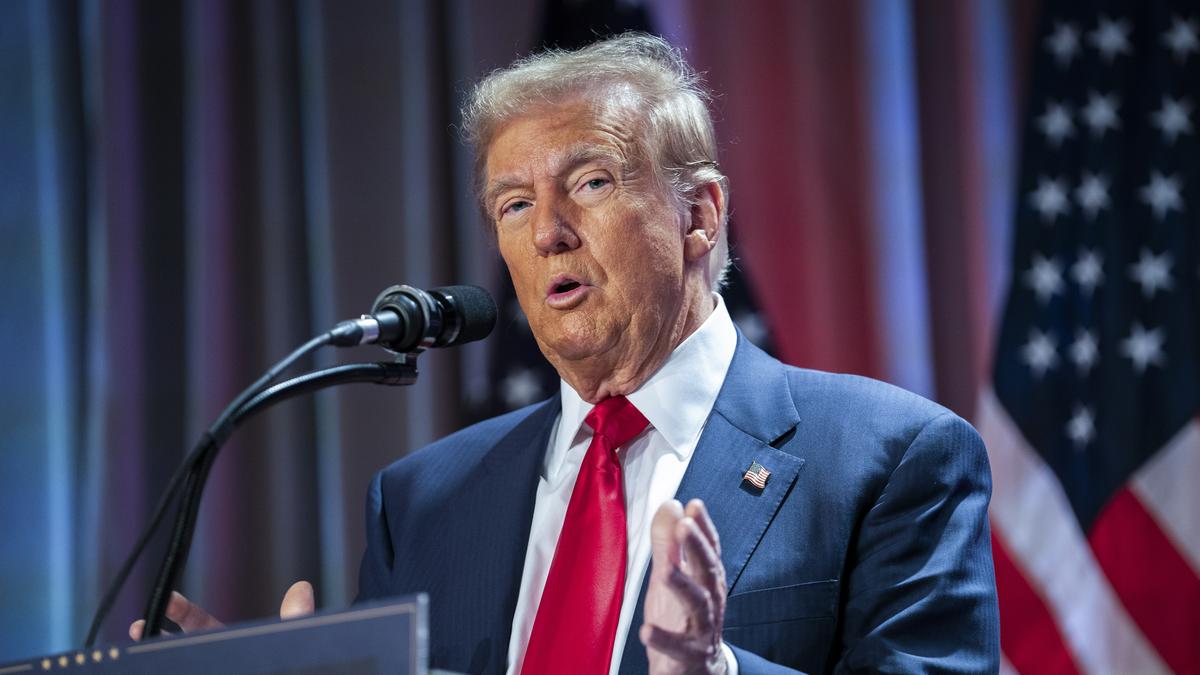
U.S. President-elect Donald Trump. File | Photo Credit: AP
The story so far: In light of the legal immunity afforded to U.S. Presidents for official acts, Department of Justice (DOJ) Special Counsel Jack Smith recently moved to drop the charges against President-elect Donald Trump for attempting to overturn the results of the 2020 election, specifically the criminal charges for encouraging a violent mob to attack the U.S. Capitol on January 6, 2021. Mr. Smith’s request was granted by the District Judge hearing the case.
What about the other cases?
The DOJ has also filed motions to drop all federal charges against Mr. Trump that relate to the latter’s “mishandling” of classified documents. Two state-level cases against him are also in legal limbo: the election interference case in Georgia has been paused pending a decision by an appeals court; in the business fraud case in New York involving charges against Mr. Trump for paying off an adult film star for her silence over an alleged affair, his conviction has been indefinitely delayed.
Scot-free: On a major legal reprieve for Donald Trump
While the dropping of these charges marks the official end of Democrats’ hopes to hold Mr. Trump liable for several alleged crimes, it remains to be seen as to whether the 45th President will use this clean slate as a springboard to a bipartisan approach to policymaking, or whether it will merely strengthen his hand towards a second inning of the brand of divisive politics that has polarised the electorate of the country in recent years.
What are the specific charges against Mr. Trump that have been dropped?
Firstly, regarding the classified documents case, Mr. Trump was first indicted in June 2023 on 37 felony counts “related to mishandling classified documents that he took from the White House to his Florida home.” These charges included wilful retention of national defence information, conspiracy to obstruct justice and making false statements. While a Florida judge had earlier dismissed the case and Mr. Smith’s office had sought an appeal, those charges are all being dropped now.
In August 2023, Mr. Trump was additionally indicted on four felony charges relating to his attempts to reverse the 2020 election results. These charges included conspiracy to defraud the U.S., conspiracy to obstruct an official proceeding (a reference to the process of certification of the election results by Congress), obstruction of and attempt to obstruct an official proceeding and conspiracy against rights.
What view has the U.S. Supreme Court taken on the subject?
The Supreme Court in July 2024 handed down its first ruling on the subject of presidential immunity when it determined, by an expected 6-3 majority, that former Presidents enjoyed broad immunity from prosecution. At the time, Chief Justice John Roberts wrote for the majority opinion of the court, “Under our constitutional structure of separated powers, the nature of presidential power entitles a former president to absolute immunity from criminal prosecution for actions within his conclusive and preclusive constitutional authority… And he is entitled to at least presumptive immunity from prosecution for all his official acts. There is no immunity for unofficial acts.”
The three liberal dissenting judges criticised the ruling as undermining the “core democratic principle that no person is above the law,” with Justice Sonia Sotomayor writing that “in every use of official power, the President is now a king above the law” and that the protection afforded to Presidents by the court was “just as bad as it sounds, and it is baseless.”
Is Mr. Trump absolved of guilt?
Not necessarily. In her latest ruling on the cases, District Judge Tanya Chutkan said that she was dismissing the election interference charges against Mr. Trump “without prejudice,” suggesting that the door to prosecuting Mr. Trump in the future has been left open, specifically after Mr. Trump demits office after his second term, and loses his legal immunity shield. Hinting at the DOJ’s view on the matter, Mr. Smith noted that the charges had been dropped because the DOJ “forbids the federal indictment and subsequent criminal prosecution of a sitting President,” while adding the decision to not proceed with the indictments and trials was “not based on the merits or strength of the case against the defendant.”
Then there are the political views of liberals and progressives, possibly including a majority of the more than 74 million Americans who voted for Mr. Trump’s rival, incumbent Vice- President and Democrat candidate Kamala Harris, in the November 5 presidential election. While voter views on Mr. Trump may vary widely in general, polling as recently as six months ago found that nearly three in five Americans (59%) agreed that Mr. Trump was guilty of the 34 felony counts on which he was convicted in the New York case, compared to just 32% who believed he was innocent. Another poll around the same time found that a whopping 50% of respondents thought that Mr. Trump’s guilty verdict on all 34 counts in his hush money trial was correct. Similarly, a poll in April this year found that 53% of respondents believed that Mr. Trump committed “serious federal crimes.”
Yet the fact that a poll in May 2024 suggested that 67% of voters — including 74% of independents — said that a conviction would make no difference for how they voted in the election offers a deeper insight into the political preferences of voters.
Published – December 01, 2024 04:00 am IST


